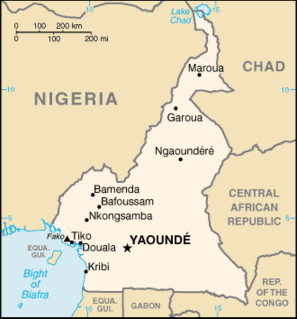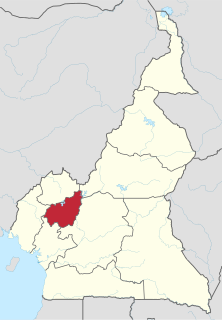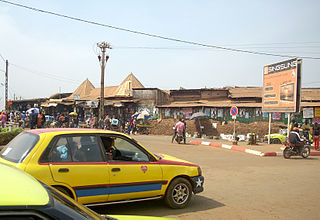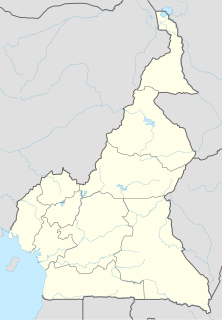
This article provides a breakdown of the transportation options available in Cameroon. The options available to citizens and tourists include railways, roadways, waterways, pipelines, and airlines. These avenues of transportation are used by citizens for personal transportation, by businesses for transporting goods, and by tourists for both accessing the country and traveling while there.

The Catholic Church in Cameroon is part of the worldwide Catholic Church, under the spiritual leadership of the Pope in Rome.

The West Region is 14,000 km² of territory located in the central-western portion of the Republic of Cameroon. It borders the Northwest Region to the northwest, the Adamawa Region to the northeast, the Centre Region to the southeast, the Littoral Region to the southwest, and the Southwest Region to the west. The West Region is the smallest of Cameroon's ten regions in area, yet it has the highest population density.

The Bamileke are a Grassfields people. They are the largest ethnic group in Cameroon and inhabit the country's West Region. The Bamileke are regrouped under several groups, each under the guidance of a chief or fon. They speak a number of related languages from the Eastern Grassfield branch of the GrassField language family. These languages are closely related, however, and some classifications identify a Bamileke dialect continuum with seventeen or more dialects. The Bamileke people are known for their very striking and often intricately beaded masquerades, including the impressive elephant mask.

Bafoussam is the capital and largest city of the West Region of Cameroon, in the Bamboutos Mountains. It is the 3rd most important (financially) city in Cameroon, after Yaounde and Douala. The communauté urbaine of Bafoussam, is a decentralized territorial collectivity. Originally called Urban Commune of Bafoussam, the communauté urbaine of Bafoussam, was born after the Presidential Decree N ° 2008/022 of January 17, 2008 and composed of three communes, namely: the Commune of Bafoussam I, the Commune of Bafoussam II (Baleng) and the Commune of Bafoussam III (Bamougoum).

Dschang is a city located in the West (Ouest) Province of Cameroon, with an estimated population of 87,000 (est) in 2001, growing dramatically from 21,705 recorded in 1981. The 2006 Population is estimated to be 200,000 inhabitants. Dschang is the capital of the division of Ménoua. The Bamiléké are the predominant ethnic tribe.
Ümit Turmuş is a Turkish football coach.

Racing Club de Bafoussam is a Cameroonian football club based in Bafoussam. They are a member of the Cameroonian Football Federation. Their home stadium is Stade Municipal de Bamendzi. They are most famous for developing Geremi Njitap.

Batié is a town and commune in the Hauts Plateau division located in the western province of Cameroon. It is located at Latitude 5.283333 and Longitude 10.28333. Batié is also well known for its MTN Elite one club Sable FC or "San San Boys". The name comes from the sand production in this mountainous region. The climate is very mild. Rainy season typically lasts from March through October. Dry season begins in November and goes into March of the following year.
The Roman Catholic Diocese of Bafoussam is a diocese located in the city of Bafoussam in the Ecclesiastical province of Douala in Cameroon.
Stade Municipal de Bafoussam is a multi-use stadium in Bafoussam, Cameroon. It is currently used mostly for football matches and serves as a home ground of Université FC de Ngaoundéré of the Cameroon Première Division. The stadium holds 5,000 spectators.
Bafoussam Airport is an airport serving Bafoussam, capital of the West Province of Cameroon.
The mass media in Cameroon includes independent outlets. The nation has only one national newspaper, which is state owned.
Statistics of the 1992 Cameroonian Premier League season.

The Championnat du Cameroun de football is the top division of association football in Cameroon, governed by the Cameroonian Football Federation since its establishment in 1961.
Penka-Michel is a commune in the West Region of Cameroon. It is found in the Menoua district, or department, in the West region of Cameroon. Penka-Michel is considered a part of Bansoa, a town between Bafoussam and Dschang. It is often referred to as 'Bansoa ville', or downtown Bansoa.
Tonga, Cameroon is a town and commune in Cameroon.
Commercial Bank Cameroon (CBC), also referred to as Commercial Bank of Cameroon, is a commercial bank in Cameroon. It is one of the fourteen (14) Cameroonian commercial banks licensed by the Central Bank of Central African States, the national banking regulator. The bank caters to both individuals and businesses through a variety of financial products. CBC is the flagship of the Commercial Bank Group, headquartered in Douala, Cameroon, with subsidiaries in Chad, Central African Republic, Equatorial Guinea and São Tomé and Príncipe.

The Bandefram-Cameroon Chiefdom. Pronounced Ndiògfap in local language, this name means farmers of old vineyards.Although Bandrefam is the official name, the population of this chiefdom call themselves Kouo'shi,which means :emerging from the ground.
This name will take the form of Fab'gwe around 1921, then of Ndiògfap around 1928. Finally, the German colonists will call it Bandrefam, as it is known today.
Samuel Wembé was a Cameroonian businessman who also served as a deputy in the Cameroon National Assembly.











